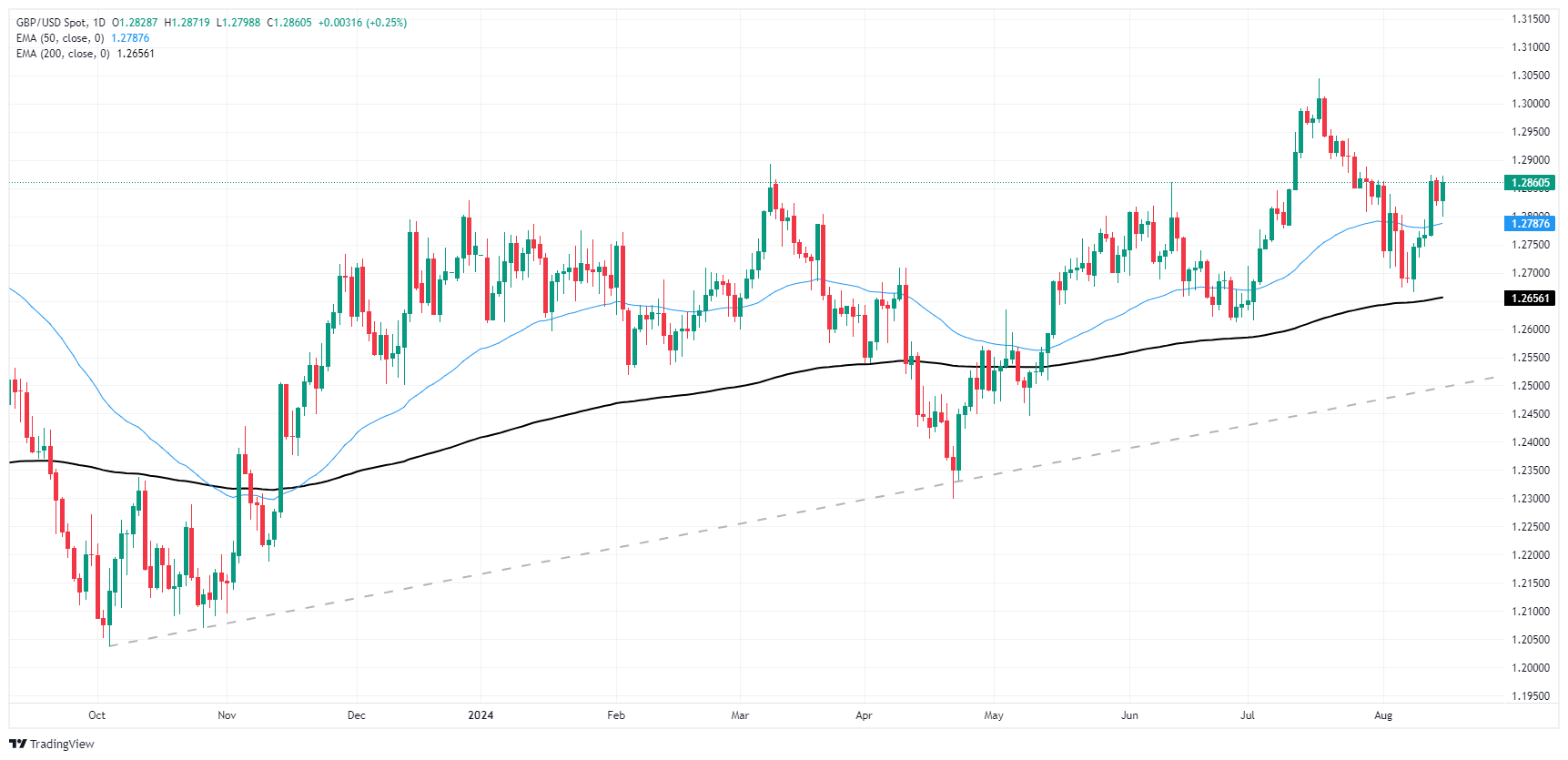- Analytics
- News and Tools
- Market News
- GBP/USD recovers balance post-US Retail Sales
GBP/USD recovers balance post-US Retail Sales
- GBP/USD traded back above 1.2860 after US Retail Sales data beat.
- Improving economic data releases ease market fears of US recession.
- UK GDP met expectations, and manufacturing improved more than expected.
GBP/USD recovered back into the high side on Thursday after a bullish tilt in UK data prints coupled with better-than-expected US Retail Sales figures helped to improve overall market sentiment and keep the Greenback pinned on the low side.
US Retail Sales growth lurched to an 18-month high of 1.0% MoM in July, well above the forecast 0.3% and entirely engulfing the previous month’s -0.2% contraction. Improving economic health indicators are helping to stave off recent concerns of a potential recession within the US. However, rate markets got cold water thrown on recent bets of a double cut from the Federal Reserve (Fed) in September.
On the UK side, Gross Domestic Product (GDP) figures for the second quarter printed exactly as expected, rising 0.6% QOQ and 0.9% YoY. Annualized GDP growth figures rebounded from the previous print of 0.3%, and UK Manufacturing Production swelled by 1.1% MoM in June, well above the forecast 0.1% and recovering from the previous month’s revised 0.3%.
GBP/USD price forecast
Cable’s bullish recovery on Thursday gave the pair the help it needed to remain on the high side of the 50-day Exponential Moving Average (EMA) 1.2787. GBP/USD caught a technical bounce after hitting the 1.2800 handle early Thursday, but bulls ran out of steam just before they could chalk in a fresh two-week high. Intraday price action is churning just north of 1.2850.
GBP/USD daily chart
Pound Sterling FAQs
The Pound Sterling (GBP) is the oldest currency in the world (886 AD) and the official currency of the United Kingdom. It is the fourth most traded unit for foreign exchange (FX) in the world, accounting for 12% of all transactions, averaging $630 billion a day, according to 2022 data. Its key trading pairs are GBP/USD, aka ‘Cable’, which accounts for 11% of FX, GBP/JPY, or the ‘Dragon’ as it is known by traders (3%), and EUR/GBP (2%). The Pound Sterling is issued by the Bank of England (BoE).
The single most important factor influencing the value of the Pound Sterling is monetary policy decided by the Bank of England. The BoE bases its decisions on whether it has achieved its primary goal of “price stability” – a steady inflation rate of around 2%. Its primary tool for achieving this is the adjustment of interest rates. When inflation is too high, the BoE will try to rein it in by raising interest rates, making it more expensive for people and businesses to access credit. This is generally positive for GBP, as higher interest rates make the UK a more attractive place for global investors to park their money. When inflation falls too low it is a sign economic growth is slowing. In this scenario, the BoE will consider lowering interest rates to cheapen credit so businesses will borrow more to invest in growth-generating projects.
Data releases gauge the health of the economy and can impact the value of the Pound Sterling. Indicators such as GDP, Manufacturing and Services PMIs, and employment can all influence the direction of the GBP. A strong economy is good for Sterling. Not only does it attract more foreign investment but it may encourage the BoE to put up interest rates, which will directly strengthen GBP. Otherwise, if economic data is weak, the Pound Sterling is likely to fall.
Another significant data release for the Pound Sterling is the Trade Balance. This indicator measures the difference between what a country earns from its exports and what it spends on imports over a given period. If a country produces highly sought-after exports, its currency will benefit purely from the extra demand created from foreign buyers seeking to purchase these goods. Therefore, a positive net Trade Balance strengthens a currency and vice versa for a negative balance.
© 2000-2026. All rights reserved.
This site is managed by Teletrade D.J. LLC 2351 LLC 2022 (Euro House, Richmond Hill Road, Kingstown, VC0100, St. Vincent and the Grenadines).
The information on this website is for informational purposes only and does not constitute any investment advice.
The company does not serve or provide services to customers who are residents of the US, Canada, Iran, The Democratic People's Republic of Korea, Yemen and FATF blacklisted countries.
Making transactions on financial markets with marginal financial instruments opens up wide possibilities and allows investors who are willing to take risks to earn high profits, carrying a potentially high risk of losses at the same time. Therefore you should responsibly approach the issue of choosing the appropriate investment strategy, taking the available resources into account, before starting trading.
Use of the information: full or partial use of materials from this website must always be referenced to TeleTrade as the source of information. Use of the materials on the Internet must be accompanied by a hyperlink to teletrade.org. Automatic import of materials and information from this website is prohibited.
Please contact our PR department if you have any questions or need assistance at pr@teletrade.global.















